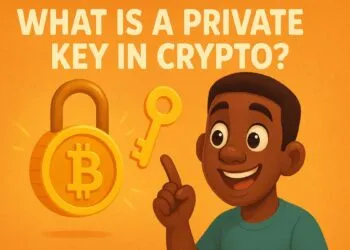In the world of crypto, you don’t get a second chance if you lose access to your wallet.
There’s no “forgot password” button. No friendly support agent to help you recover your funds. If you misplace your private key or seed phrase — or if your device breaks and you didn’t back anything up — your crypto could be lost forever.
This might sound scary, but the truth is:
Most losses are preventable — if you take the right steps in advance.
In this guide, we’ll explore:
- Why users lose access to their wallets
- What happens next depending on the wallet type
- What you can (and can’t) recover
- And how to protect yourself from irreversible mistakes
New to crypto keys? Start with: What Is a Private Key in Crypto?
Why People Lose Access to Their Wallets
Losing access to a crypto wallet is more common than most people think — and it often happens because of small mistakes that seem harmless at first.
One of the most frequent reasons is simply not backing up the seed phrase. Many users create a wallet, see the 12 or 24 words pop up on the screen, and think, “I’ll write them down later.” But later never comes — and if the phone is lost, stolen, or reset, the funds are gone with it.
Others lose access by forgetting the password to an encrypted wallet file, especially when using non-custodial desktop wallets like Electrum. Without that password or the seed phrase, there’s no way to get back in.
Another common scenario? Device loss or damage.
If you’re using a hardware wallet like Ledger or Trezor and it gets physically destroyed — without a backup of your seed — your access is gone forever. Even if you still “own” the crypto on the blockchain, you have no way to move or use it.
There’s also the growing problem of phishing attacks.
Scammers trick users into revealing their seed phrase or private key by impersonating support teams or creating fake wallet apps. Once the attacker gets your key, they transfer your funds instantly, locking you out completely.
And finally, some users rely on custodial wallets from exchanges like Binance or Coinbase, but lose access to their account credentials. In these cases, recovery may be possible — but only if identity verification is an option and you’re within the platform’s rules.
Real Example: In 2021, a user famously lost access to over $200 million in Bitcoin because he forgot the password to his encrypted IronKey drive — and only had two attempts left before it permanently locked.
What Happens Next? Is Recovery Possible?
Once you lose access to your crypto wallet, what happens next depends entirely on the type of wallet you were using — and how well you prepared for this moment.
If your wallet is non-custodial (like MetaMask, Trust Wallet, or a hardware wallet), and you don’t have your seed phrase, the reality is tough:
There’s no way to recover access.
No company stores your seed. No support team can help you. The blockchain is designed to be permissionless and irreversible — which means no one, not even the wallet developer, can undo the loss.
If you were using a hardware wallet (such as Ledger or Trezor), you still have a chance — but only if you previously wrote down your seed phrase. You can restore your wallet on a new device using the same seed. If you didn’t save it, there’s nothing you can do.
On the other hand, if your funds were held in a custodial wallet — like Binance, Kraken, or Coinbase — things work differently. These platforms control your private keys, which means they can help you recover access if you lose your login credentials, usually through email verification or identity checks (KYC). But you’re also trusting them to secure your assets on your behalf.
This difference — between custodial and non-custodial wallets — is crucial. It defines whether you can get help… or not.
Pro Tip: Not sure which one you’re using? If your wallet asked you to save a seed phrase when you created it — it’s non-custodial, and the responsibility is all yours.
How to Prevent Losing Access (for Real)
Losing access to your wallet is one of the most painful mistakes in crypto — but the good news is, it’s almost always preventable.
The most important thing you can do is securely back up your seed phrase.
Write it down by hand on paper — don’t take a screenshot, don’t save it in your email, and definitely don’t upload it to the cloud. Then, store that paper in a safe place. Even better: create two copies, and keep them in separate, secure physical locations. This protects you from both theft and accidental damage.
If you’re using a hardware wallet, follow the manufacturer’s instructions carefully. Most hardware wallets allow you to set a PIN, and some even let you add a passphrase as a second layer of protection. But remember: if you forget your PIN and lose your seed phrase, even a hardware wallet can’t save you.
For those managing larger amounts, or running a shared treasury (like a DAO or a project fund), consider using a multi-signature wallet. This setup requires multiple people (or devices) to approve transactions — so even if one device is lost, the wallet can still be accessed safely.
Whatever method you choose, the goal is simple:
Have a backup plan — before you need it.
Because once you lose access, there’s no pause button. No emergency call. Just a lesson learned too late.
FAQs – Wallet Access and Recovery
Can I recover my wallet without the seed phrase?
If you’re using a non-custodial wallet, the answer is no.
Without the seed phrase or private key, your funds are lost forever.
There’s no centralized authority to reset access — that’s the nature of blockchain.
What if I forget my wallet password?
If it’s just the app password (e.g., for MetaMask or Trust Wallet), you can often reset it — but only if you still have the seed phrase.
If you don’t, the wallet can’t be restored.
Can crypto exchanges help recover access?
Yes — if you’re using a custodial exchange like Binance or Coinbase.
They can reset your login through identity verification, assuming you meet KYC requirements. But this only works if they control the private keys.
Is there a service that can recover my wallet?
No legitimate service can recover your wallet if you’ve lost the private key or seed phrase.
Beware of scams offering “recovery tools” — they often aim to steal your remaining funds.
Can I avoid this risk entirely?
Yes — by preparing.
Write down your seed phrase, store it offline, test recovery periodically, and use hardware wallets or multi-sig for added security.
Read more: Best Practices to Keep Your Crypto Safe in 2025
Final Thoughts: Don’t Wait Until It’s Too Late
Losing access to your wallet doesn’t always happen because of negligence — sometimes it’s a broken phone, a stolen laptop, or simply forgetting where you put your backup.
But the consequences are the same: if you’re not prepared, you could lose your crypto forever.
That’s why every user — beginner or expert — should treat their seed phrase like the digital key to their financial future. Store it safely. Back it up twice. And most importantly, make sure you know how to restore your wallet before disaster strikes.
Because in crypto, you don’t get second chances — you get security or regret.
Useful Next Reads:
- Best Mobile Crypto Wallets for iOS & Android (2025 Edition)
- How to Keep Your Crypto Safe in 2025 – Security Best Practices








